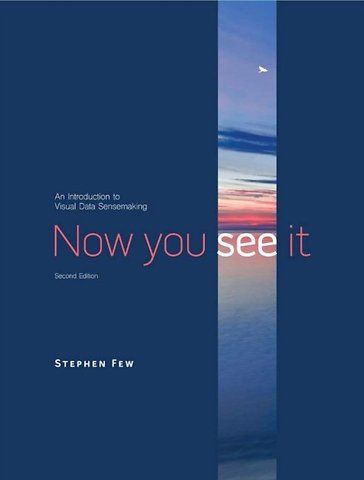Now You See It
An Introduction to Visual Data Sensemaking
Samenvatting
Now You See It does for visual data sensemaking what Show Me the Numbers does for graphical data presentation: it teaches simple, fundamental, and practical concepts, principles, and techniques that anyone can use—only this time they're exploring and making sense of information, not presenting it. These techniques rely primarily on something almost everyone has: vision. They use graphs to display data in ways that make meaningful patterns visible to reveal the stories that reside within. These techniques also involve interacting with data in particular ways to tease out relevant facts and their meanings.
Although some quantitative data sensemaking can only be done with sophisticated statistical techniques, most of the questions that organizations typically ask about their data can be answered using simple visualization techniques—techniques that can be learned by people with little or no statistical training. In other words, Now You See It is for the great majority of people whose jobs require them to make sense of quantitative information.
This second edition of the book now integrates the contents of Stephen Few's book Signal: Understanding What Matters in a World of Noise, which extends it into the realm of Statistical Process Control.
Specificaties
Inhoudsopgave
INTRODUCTION 1
We Have a Skills Problem 1
The Nature of Data and Data Processing 6
The Nature of Signals 7
The Approach of this Book 9
PART I BUILDING A FRAMEWORK FOR VISUAL DATA SENSEMAKING 11
1. THE MEANING AND HISTORY OF DATA VISUALIZATION 15
Meanings of the Term Visualization 15
A Brief History of Data Visualization 16
2. PREREQUISITES FOR DATA SENSEMAKING 21
Aptitudes and Attitudes 21
Domain Knowledge 26
Multidisciplinary Thinking 26
Traits of Useful Data 29
3. THINKING WITH OUR EYES 33
The Power of Visual Perception 33
How Visual Perception Works 35
Using Knowledge of Perception to Create Effective Visualizations 36
Making Abstract Data Visible 38
Overcoming the Limits of Memory 52
The Building Blocks of Data Visualization 55
4. VISUAL DATA SENSEMAKING INTERACTION AND 59
NAVIGATION
Interaction 59
Navigation 87
PART II GETTING THE LAY OF THE LAND 97
Data Vistas 97
Context, Context, Context 101
Data Fitness 103
Variation and Relationships 104
5. VARIATION WITHIN CATEGORICAL VARIABLES 107
Ranking and Part-to-Whole Relationships 107
Graphs of Counts, Sums, and Averages 109
Other Graphs for Ranking and Part-to-Whole Relationships 119
6. VARIATION WITHIN QUANTITATIVE VARIABLES 125
Distribution Relationships 125
Normal Distributions 128
The Nature of Randomness 133
Non-Normal Distributions 134
Homogeneity and Heterogeneity 137
Means and Medians 137
Graphs for Examining a Single Distribution 141
Graphs for Examining Multiple Distributions 148
Exploring Distributions – An Example 162
7. VARIATION ACROSS SPACE 165
Spatial Relationships 165
Visualizations for Spatial Sensemaking 165
Encoding Values in Space 168
Comparing Spatial Values within Categories, including Time 173
8. VARIATION THROUGH TIME 177
Time-Series Patterns 177
Line Graphs for Examining Time-Series Patterns 178
Graphs for Special Circumstances 187
Time-Series Techniques and Best Practices 192
9. RELATIONSHIPS AMONG QUANTITATIVE VARIABLES 203
Quantitative Co-relationships 203
Correlation and Causation 204
Key Characteristics of Correlations 206
Scatter Plots for Viewing Two Quantitative Variables 210
Summarizing Correlations with Lines 212
Scatter Plot Best Practices 214
Resistance Is Not Futile 222
Curvy Models 225
Transformations 227
Regression Analysis 228
Table Lens Displays for Viewing More than Two Quantitative 230
Variables
10. RELATIONSHIPS AMONG CATEGORICAL VARIABLES 235
Visual Crosstabs 235
CONTENTS vii
11. RELATIONSHIPS AMONG MULTIPLE VARIABLES AND 239
PERSPECTIVES
Multi-perspective Views 239
Multivariate Relationships 247
PART III SEPARATING SIGNALS FROM THE NOISE 253
12. AN INTRODUCTION TO STATISTICAL PROCESS CONTROL 255
Processes and How They Speak 255
Wishing Won’t Make It So 256
Homogenous Enough for Signal Detection 257
Long Enough and Often Enough for Signal Detection 257
Signals in Variation through Time 258
Adaptations of Statistical Process Control 265
EPILOGUE – WISDOM IN THE AGE OF INFORMATION 281
APPENDICES
Appendix A: Adjusting for Inflation in Excel 283
Appendix B: Creating Quantile Plots in Excel 285
Appendix C: Creating XmR Charts in Excel 289
BIBLIOGRAPHY 293
INDEX 297
Anderen die dit boek kochten, kochten ook
Net verschenen
Rubrieken
- aanbestedingsrecht
- aansprakelijkheids- en verzekeringsrecht
- accountancy
- algemeen juridisch
- arbeidsrecht
- bank- en effectenrecht
- bestuursrecht
- bouwrecht
- burgerlijk recht en procesrecht
- europees-internationaal recht
- fiscaal recht
- gezondheidsrecht
- insolventierecht
- intellectuele eigendom en ict-recht
- management
- mens en maatschappij
- milieu- en omgevingsrecht
- notarieel recht
- ondernemingsrecht
- pensioenrecht
- personen- en familierecht
- sociale zekerheidsrecht
- staatsrecht
- strafrecht en criminologie
- vastgoed- en huurrecht
- vreemdelingenrecht







